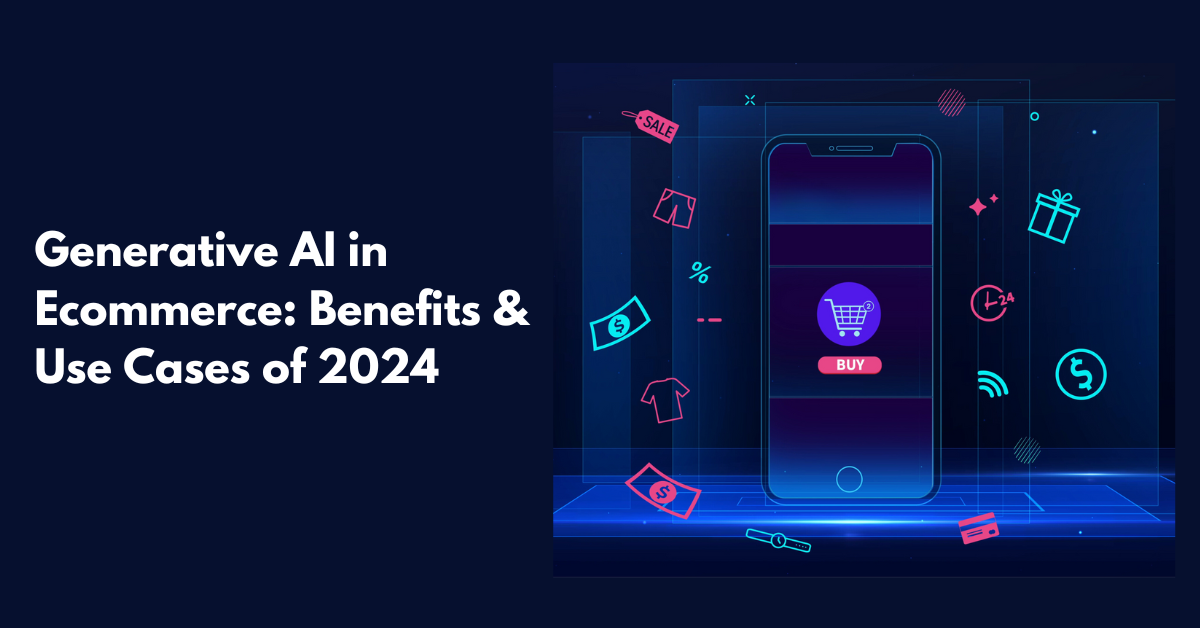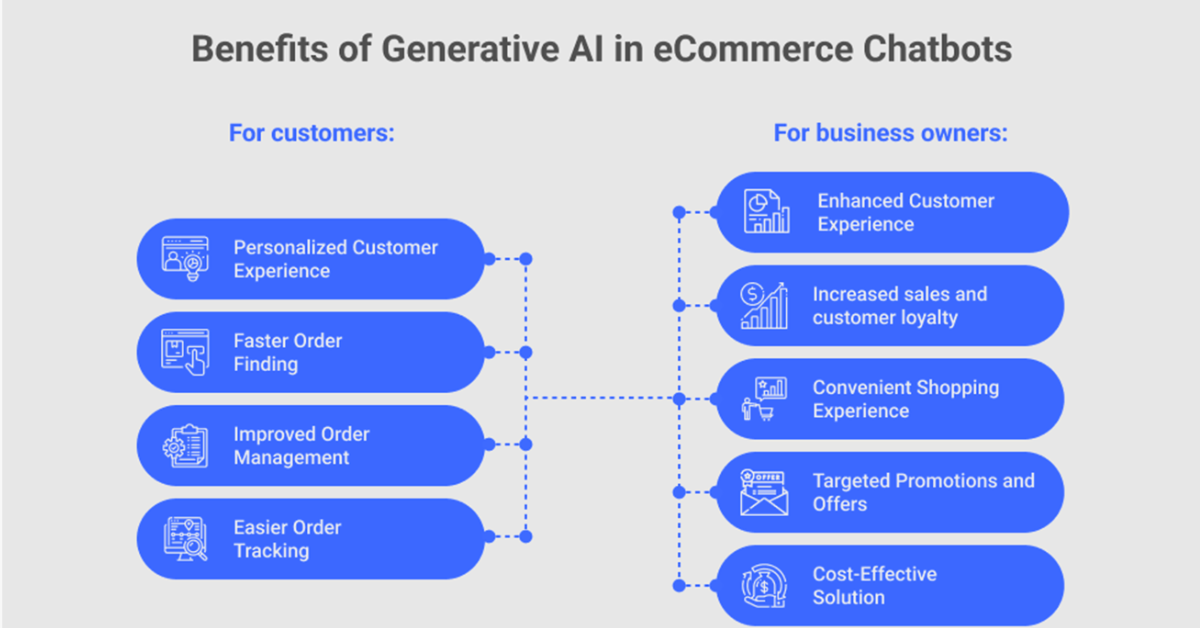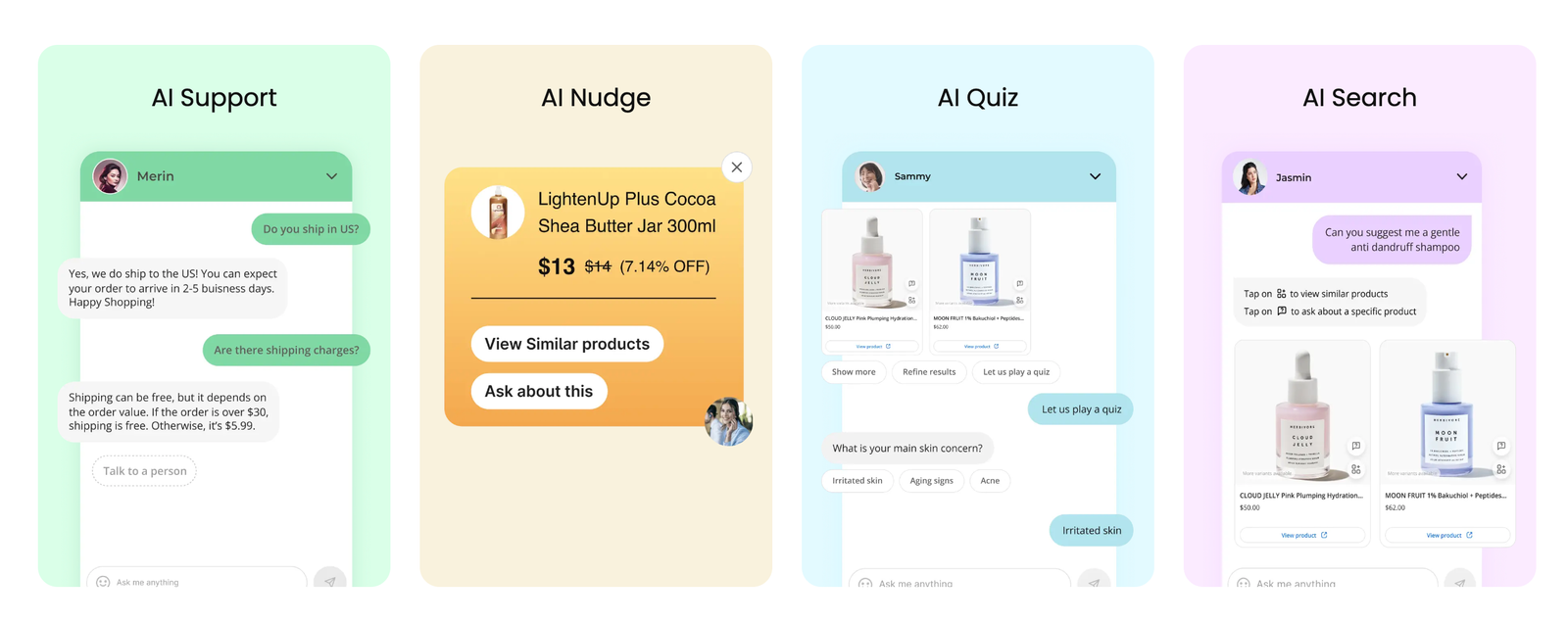Generative AI in Ecommerce: Benefits & Use Cases of 2024

Generative AI continues to reshape ecommerce, streamlining operations and enriching customer experiences. Recent studies reveal that over 60% of online retailers now harness this technology to customize shopping journeys and generate dynamic product descriptions, significantly boosting engagement and sales.
This blog is about the role of generative AI in ecommerce and how these advancements are practically applied, from automated content creation to personalized customer interactions, illustrating the tangible benefits for businesses striving to stay competitive in a digital-first marketplace.
What’s Generative AI?

Generative AI refers to artificial intelligence technologies that can create content, such as text, AI images, and music, by learning from vast amounts of data. As of 2024, these technologies have gained prominence due to their ability to automate and enhance creative processes across various industries. A significant advancement is their capacity to generate realistic and contextually appropriate outputs.
For instance, in the media sector, generative AI is now responsible for about 30% of content creation, demonstrating not only its effectiveness but also its increasing adoption. This type of AI operates by understanding and analyzing patterns in existing data and then using this understanding to produce new, original content. This capability is transforming how businesses operate, offering innovative solutions to old problems and creating new opportunities for growth and efficiency.
Generative AI and Ecommerce

Generative AI is revolutionizing the ecommerce industry by enabling more personalized and efficient shopping experiences. This technology leverages machine learning algorithms to analyze customer data and generate tailored content. Here's the usage of generative AI in ecommerce:
- Personalized Product Recommendations: Generative AI personalisation in ecommerce analyzes previous purchasing behavior and browsing habits to suggest products that are more likely to appeal to individual customers. This personalization enhances the shopping experience and can increase sales by making relevant recommendations that meet the unique needs of each shopper.
- Customized Content Creation: Online retailers are using generative AI to automate the creation of product descriptions, reviews, and promotional content. This not only saves time but also ensures that the content is optimized for search engines, increasing the visibility of products.
- Virtual Try-Ons and Showrooms: By integrating generative AI with augmented reality (AR), ecommerce platforms offer virtual try-ons and 3D showrooms. Customers can see how clothes will look on them or how furniture might fit in their space before making a purchase, reducing return rates and enhancing customer satisfaction.
- Dynamic Pricing: Generative AI helps businesses dynamically adjust prices based on factors like demand, inventory levels, and competitor pricing. This capability allows ecommerce companies to remain competitive and maximize profits through strategic pricing.
- Customer Support Automation: AI-driven chatbots can handle a wide range of customer inquiries, from tracking orders to handling returns. These chatbots learn from each interaction to improve their responses over time, offering quicker and more accurate support to customers.
Generative AI Ecommerce Strategy
Developing a generative AI strategy for ecommerce involves integrating intelligent tools to enhance both the consumer experience and operational efficiency. The first step in crafting this strategy is to identify key areas of your ecommerce business that can benefit most from automation and personalization. For instance, product recommendation engines powered by generative AI can analyze customer data to predict and suggest products that align with individual preferences, driving sales and improving customer satisfaction.
Another strategic application is in content generation. Generative AI can produce accurate and appealing product descriptions and marketing materials, which saves time and resources while maintaining a consistent brand voice across all platforms.
Customer support is also transformed by generative AI, with chatbots capable of handling a wide range of customer inquiries without human intervention. This not only speeds up response times but also frees up human agents to tackle more complex issues, enhancing overall service quality.
Finally, it's crucial to continuously monitor the performance of AI implementations and gather feedback to refine and optimize the strategy. Regular updates and training with new data will ensure the AI tools evolve with consumer trends and business needs, maintaining a competitive edge in the rapidly changing ecommerce landscape.
Benefits of using Generative AI in Ecommerce

Generative AI offers several compelling advantages for ecommerce businesses in 2024:
- Enhanced Product Descriptions: Automatically generates detailed and attractive product descriptions, saving time and ensuring consistency across thousands of listings.
- Personalized Shopping Experiences: Utilizes customer data to create personalized product recommendations and promotions, leading to higher engagement and increased sales. A recent study found that personalization can boost customer spending by up to 20%.
- Improved Customer Support: Powers chatbots that provide instant, 24/7 customer service, handling inquiries and resolving issues quickly, which is essential as customer expectations for rapid responses rise.
- Streamlined Inventory Management: Predicts trends and customer preferences, aiding in more accurate stock management and reducing overstock or stockout situations.
- Creative Marketing Campaigns: Crafts unique and compelling marketing content, including images and videos, tailored to specific audiences, enhancing campaign effectiveness.
Generative AI Use Cases in Ecommerce
Generative AI is transforming the ecommerce landscape in various ways, particularly through its ability to create personalized and efficient shopping experiences. Here are ten practical use cases where this technology is making a significant impact:
- Personalized Product Recommendations: Generative AI analyzes customer data to suggest products that align with their preferences and past purchasing behavior, enhancing the shopping experience and increasing sales.
- Automated Product Descriptions: This technology generates unique and detailed product descriptions based on item specifications and attributes, saving time and improving SEO rankings.
- Personalized In-Person Checkout Experience: For brick-and-mortar stores, generative AI integrates with point-of-sale systems to offer personalized checkout options, such as tailored discounts and offers, enhancing customer satisfaction.
- Customer Service Chatbots: AI-powered chatbots handle inquiries and support tickets, offering quick responses outside of traditional business hours, and reducing the workload on human staff.
- Inventory Management: Generative AI forecasts demand and optimizes stock levels, reducing overstock and understock situations, thus saving costs and improving supply chain efficiency.
- Virtual Try-Ons: This technology creates realistic models of customers trying on clothes, glasses, or even makeup, providing a try-before-you-buy experience online.
- Dynamic Pricing: AI algorithms analyze market conditions and consumer behavior to adjust prices in real-time, maximizing profit margins and competitiveness.
- Email Marketing Content Creation: Generative AI crafts personalized email content for marketing campaigns based on consumer data and engagement trends.
- Visual Product Customization Tools: AI enables customers to see customizable products change in real time as they select different options, enhancing user engagement and satisfaction.
- Predictive Analytics for Customer Behavior: By analyzing past behavior, AI predicts future buying trends, helping retailers craft better marketing strategies and product offerings.
How Manifest AI become the best generative solution for ecommerce businesses?

Manifest AI has established itself as a leading generative AI solution for ecommerce businesses by enhancing the online shopping experience through smart, automated features. As an AI shopping assistant, Manifest AI utilizes advanced algorithms to interact with customers, understand their needs, and provide tailored support and product suggestions.
Features of Manifest AI:
- AI Search: This feature allows customers to use natural language to search for products, making the search process more intuitive and efficient. It understands user queries contextually, offering more accurate search results that match shopper intentions.
- AI Nudges: Manifest AI intelligently prompts users with helpful suggestions and reminders based on their browsing patterns and previous interactions. This not only enhances user engagement but also increases the likelihood of conversions.
- AI Quiz: Through interactive quizzes, Manifest AI gathers preferences and specific requirements from shoppers. This information is used to tailor product recommendations that closely match each customer's unique needs.
- AI Support: It provides round-the-clock customer support, answering questions and resolving issues instantly. This continuous availability ensures customer satisfaction and builds trust.
Benefits:
- Improved Customer Experience: By using these AI-driven features, Manifest AI delivers a personalized and engaging shopping experience, leading to higher customer satisfaction and loyalty.
- Increased Sales: Personalized recommendations and effective nudges drive higher conversion rates by making relevant products more visible and appealing to shoppers.
- Operational Efficiency: Automating customer interactions and support frees up human resources for other critical tasks, improving overall operational efficiency.
- Enhanced Data Insights: The AI gathers and analyzes data from customer interactions, providing valuable insights that can inform business decisions and strategic planning.
Conclusion
Generative AI continues to prove its value in ecommerce by providing solutions that enhance customer interactions and streamline business operations. From personalized product recommendations to efficient customer support, these technologies are reshaping how companies approach online retail. By adopting generative AI, businesses are not only able to offer more engaging shopping experiences but also enjoy significant improvements in operational efficiency. As we move forward, the integration of such AI tools is likely to become even more prevalent, setting new standards for success in the ecommerce sector.

.png)
